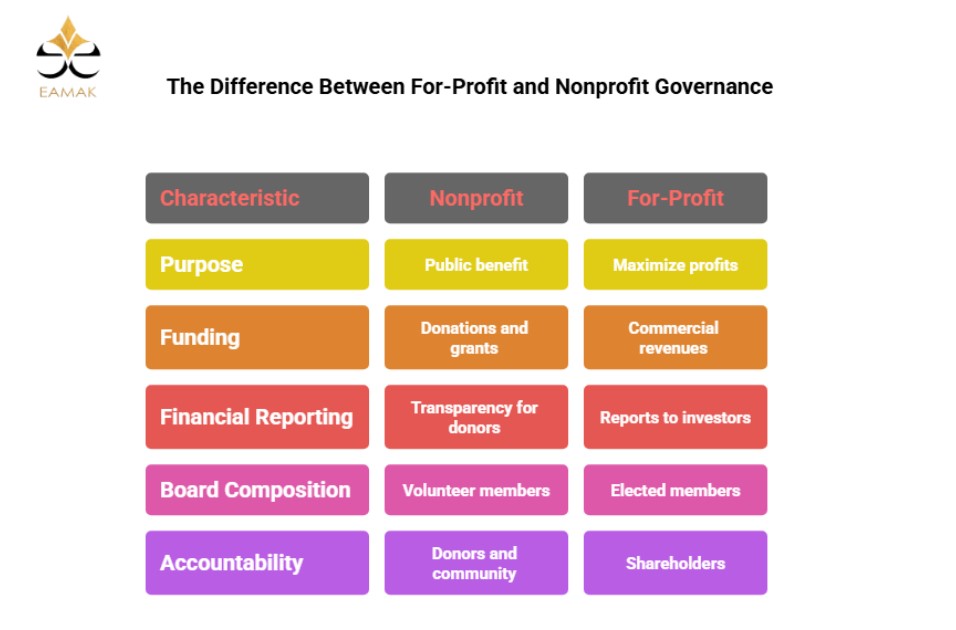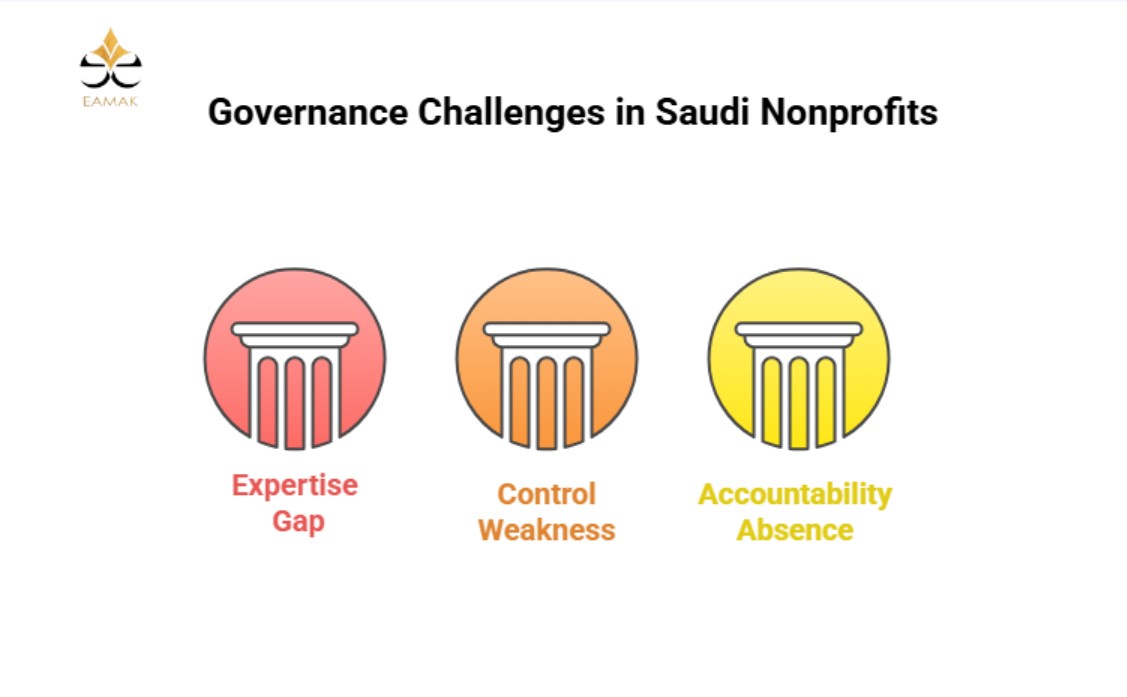Nonprofit Governance: Foundations, Challenges, and Opportunities
- Posted by:
- Category: Uncategorized

Nonprofit governance has become an essential requirement to ensure transparency, efficiency, and sustainability, especially with the increasing reliance on institutional work and the growing number of charitable associations and organizations, particularly in the Kingdom of Saudi Arabia. As these organizations play a larger role in serving society, it has become crucial to apply governance principles to build trust with donors and achieve sustainable growth.
Definition of Nonprofit Governance
The definition of nonprofit governance refers to a set of policies and procedures that regulate the relationship between the board of directors, executive management, and stakeholders.
This type of governance aims to ensure transparency, achieve developmental goals efficiently, and protect resources. It differs from governance in for-profit companies in its non-commercial nature and its focus on public benefit rather than profit maximization.
Importance of Governance for Ensuring Transparency
The importance of governance for ensuring transparency is one of the key pillars driving the effective application of governance in nonprofit institutions.
An organization that applies strong governance practices is more capable of gaining the trust of donors and beneficiaries. It also demonstrates a clear commitment to ethical standards, helps reduce financial and administrative risks, and ensures continuous oversight of performance.
The Difference Between For-Profit and Nonprofit Governance
 The difference between for-profit and nonprofit governance lies in the fundamental goal of each type. For-profit companies focus on generating financial returns for shareholders, while nonprofit organizations aim to fulfill their social mission without profit incentives.
The difference between for-profit and nonprofit governance lies in the fundamental goal of each type. For-profit companies focus on generating financial returns for shareholders, while nonprofit organizations aim to fulfill their social mission without profit incentives.
Key differences include:
- Purpose: For-profit companies seek to maximize profits, while nonprofit institutions focus on providing services and achieving public benefit.
- Funding: Companies rely on commercial revenues, while nonprofits depend on donations and grants.
- Financial Reporting: Companies are required to report to investors, while nonprofits focus on transparency for donors and the public.
- Board Composition: Nonprofit boards often consist of volunteers, unlike profit-driven companies.
- Accountability: For-profit companies are accountable to shareholders, whereas nonprofits are accountable to donors and the community.
Despite these differences, the core principles of governance, such as transparency, accountability, and efficiency, are shared across both types.
For more on this topic, see the article Introduction to Corporate Governance.
Core Principles of Nonprofit Governance
Core principles of nonprofit governance include:
- Transparency: Making financial and operational reports publicly available.
- Accountability: Holding management accountable to the board and the organization accountable to donors and the public.
- Fairness: Ensuring equality and equal opportunities in decision-making.
- Independence: Avoiding conflicts of interest, especially in donation and procurement committees.
Applying these principles helps achieve sustainability and also supports the establishment of nonprofit governance based on both international and local standards.
Role of the Board and Oversight Committees in Nonprofit Institutions
The role of the board and oversight committees in nonprofit institutions goes beyond merely approving general policies. It extends to monitoring financial performance, ensuring compliance with laws and regulations, and contributing to strategic planning.
Oversight committees—such as audit and governance committees—are powerful tools to ensure quality implementation and alignment of activities with the organization’s mission.
A successful example is the Bill & Melinda Gates Foundation, which adopts a comprehensive governance model that includes an independent board of trustees, impact assessment committees, and a detailed reporting system that enhances transparency and ensures accountability.
Challenges Facing Governance in the Nonprofit Sector in Saudi Arabia
 There are several challenges facing governance in the nonprofit sector in Saudi Arabia, including:
There are several challenges facing governance in the nonprofit sector in Saudi Arabia, including:
- A lack of specialized expertise in governance.
- Weak implementation of internal control mechanisms.
- Absence of a culture of self-evaluation and independent accountability.
However, the Saudi government has begun implementing a number of reforms and legislations to support the sector. These include the new Law of Associations and Nonprofit Organizations and initiatives launched by the National Endowment Authority. These efforts point to a promising future for nonprofit governance in Saudi Arabia.
Additionally, Saudi institutions are adopting successful governance models used in family business governance to achieve greater sustainability.
Recommendations for Enhancing Governance in Nonprofit Institutions
We conclude this article by offering recommendations for enhancing governance in nonprofit institutions, including:
- Establishing clear policies to prevent conflicts of interest.
- Training board members and staff on governance principles.
- Creating independent committees to review financial and administrative performance.
- Activating internal evaluation and impact measurement systems.
- Strengthening partnerships with specialized regulatory and advisory bodies.
Implementing these recommendations is a practical step toward strengthening nonprofit governance, enhancing the trust of donors and beneficiaries, and guiding institutions toward better and more transparent performance.
FAQ’s
Q: What is the importance of governance in nonprofit institutions?
A: Governance ensures transparency, helps achieve goals efficiently, and builds trust between the organization and its donors.
Q: What is the difference between governance in for-profit and nonprofit organizations?
A: For-profit organizations focus on profits, while nonprofits aim to serve the community and create a positive impact.
Q: How can I improve governance in my nonprofit organization?
A: By training staff, forming independent committees, and applying transparent and regular evaluation practices.
Conclusion
Nonprofit governance is the cornerstone for ensuring that social goals are met with integrity and efficiency. As this sector grows, it becomes increasingly necessary to establish flexible governance systems based on transparency and accountability, systems that enable institutions to sustain, grow, and create real, lasting impact.
Why Choose Eamak?
If you manage a nonprofit institution and seek to enhance your level of governance, Eamak for Financial and Administrative Consulting is your ideal partner.
We provide practical consulting solutions and help you build a comprehensive governance system based on international standards and aligned with Saudi Arabia’s regulatory environment.
Contact us now and let Eamak’s experts guide you on your journey to effective and sustainable institutional excellence.
